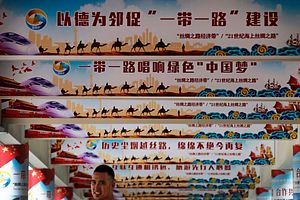Understanding the “black box” of Chinese politics and foreign policymaking is a daunting endeavor, especially when it involves the ambitious Belt and Road Initiative, a broad proposal that incorporates projects in more than 60 countries. The Belt and Road Initiative (BRI) is hailed by Chinese officials and academics as an unprecedented panacea for global needs, a multilateral proposal to upgrade infrastructure, improve China’s bilateral ties, and international institutions, as well as drive much needed global development. On the other end of the spectrum, Western and English language sources discuss BRI with suspicion and mistrust, raising accusations of “debt diplomacy,” neocolonialist ambitions, or that China is undertaking a “new Marshall Plan.” The Chinese government fiercely opposes these claims, arguing that this take is simple manipulation aimed to ramp up suspicion of China’s intentions abroad.
What is lost in these extremes is the diversity of voices within China that express nuanced thoughts on implementation of the BRI, its strengths, weaknesses, and ideal next steps. Western sources, even established papers such as the New York Times, paint the picture that the Belt and Road Initiative benefits from complete, monolithic, and oppressive support. The reality is far more complicated: The BRI, its purpose, and the risks, are a subject of lively discussions among all echelons of Chinese society. Chinese authors express varied words of caution and thoughtful engagement, ranging from concerns about China’s global awareness, to its focus on long-term strategy, framing, and ability to address inevitable geopolitical competition. These opinions have an impact in shaping government responses. Academics, business owners, and think tank researchers are increasingly recruited to provide perspective and suggestions on government aims. In short, the powers that be in Beijing are listening to the outside world, but they are also listening to their own thinkers.
Some analysts raise concerns that China’s global awareness is insufficient to adequately operate in so many countries, an anxiety shared by international analysis who fear that “debt traps” are inevitable. Wuhan University Economics and Management School Professor Dr. Cheng Chengping and Wuhan University Ph.D. candidate Wu Fang acknowledge the huge risk of operating in diverse regions, each with its own geopolitical and financial risks. They argue that the Belt and Road Initiative must align more closely with localized needs and conditions in order to create a sustainable strategy. In order to prevent these clear risks, they assert that China must work with participating countries to develop different coordinating mechanisms, particularly in finance and industrial capacity.
While some Western analysts may fear that the BRI is China’s strategy for world dominance, some Chinese analysts have the opposite fear: that the BRI is blindly operating in regions without a long-term vision or careful preparation. China Institute of International Studies Department for European-Central Asia Studies Deputy Director Li Ziguo asserts that BRI’s challenges are encapsulated by a need for long term strategic planning. Without such forethought, the business risks are equally clear to Li: Chinese firms lack awareness of legal standards in partner countries, ignore environmental risks, and make poor investment decisions based on limited understanding of partner countries’ local business conditions. The Belt and Road Initiative needs a better approach to managing geopolitical competition, argues CCP International Liaison Department Contemporary World Research Center Researcher Zhao Minghao. As China seeks to undertake large scale infrastructure projects, the United States, Japan, and India will continue to challenge for dominance in the Indo-Pacific.
Other voices are clearly reacting to outsider perceptions of the Belt and Road Initiative, seeing how critics view the plan and questioning the BRI’s optics. The central government’s overly ambitious framing of the BRI is a “fatal error,” writes South China University of Technology Institute of Public Policy Chairman Dr. Zheng Yongnian. By linking the Belt and Road Initiative to so many regions and projects, Western nations will naturally grow suspicious of China’s intentions. Unless the BRI becomes less ideological in its framing, it is unavoidable that China will be accused of seeking global hegemony.
The government is sensitive to language and discussion of the Belt and Road Initiative, whether that occurs domestically or internationally. When facing criticism and suspicious abroad, the Chinese government is forced to mediate the expectations of partner countries and international observers, with only modest gains. The more debate on the BRI grows among Chinese elites, the more the Chinese government will also have to moderate those expectations at home as well.
While the global discussion of the Belt and Road Initiative is lively and ongoing, an additional challenge is that there are limited ways for these international and domestic discussions to occur together. Without empowering converging voices to discuss and engage, the risk of creating self-perpetuating feedback loops is high. International critiques will continue to prompt defensive responses at home, making the Chinese domestic environment for policy criticism less open and more restrictive. To improve Belt and Road implementation, all voices need to be heard.
Hannah Feldshuh is a policy analyst at a China-based research firm.

































